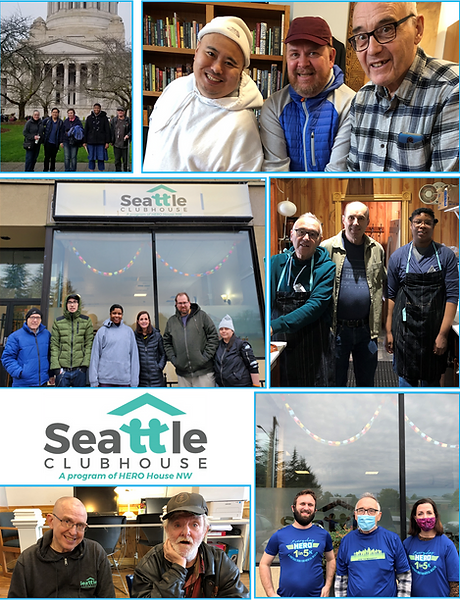A Refuge in Little Saigon
by Tim ‘Birch’ Schooler
The setting was a snowy day in Seattle, and things were fine since we interviewed by streaming video. The Seattle Clubhouse proper is near the corner of 14th and Main Streets in the Little Saigon neighborhood. Clubhouse staff opened on that day, though there was to be an earlier-than-usual closure because of bad roads from the weather.
“The Seattle Clubhouse is a safe space where members living with mental illness can step out of the shadows of social isolation and into the light of a healing community. Through meaningful relationships, our Clubhouse members have real opportunities to reintegrate into society by becoming gainfully employed, pursuing education, and attaining stable housing.”
In the digital sphere of Clubhouse and prior to our interview was the occasion for several members to chat by video conference from their homes. Nik, a Clubhouse associate, provided details from working on the Recovery Times newsletter.
He organizes a monthly schedule for production. He has taken it from a rudimentary packet that went out on a quarterly basis prior to his arrival to a monthly newsletter. We sat by our computer screens, and I started by asking Nik about the evolving Recovery Times newsletter.
“I thought that we could expand it,” he said.
Since it is now published monthly, among the benefits of improved formatting, there is further engagement with the members in the work of the Clubhouse. Recovery Times has become a creative outlet for writing and for poetry of the Clubhouse members. Nik went on to explain, “We have a lot of people who want to write. It so happened that it developed that way.”
Prior to his moving to Seattle, Nik contributed to a book created by the Clubhouse in Hawaii. Nik recorded responses of Clubhouse members in meetings in Hawaii. After he transcribed their comments, they were added to the coffee table book. He “wanted to give something back” to the Hawaii Clubhouse. A copy of that coffee table book was presented to lawmakers to emphasize the importance of the Clubhouse to its members.

Then as now, Nik wants to give a voice to people who might not otherwise have a means of expression. Fast forward to his time in Seattle and Nik had no prior experience with the software that the Clubhouse uses for the Recovery Times. He uses that application because it is affordable.
Nik also talked about the editions of the Recovery Times which is a printed publication firstly, but also has a digital distribution. He said that making something only as one thing does not involve more people. Print and digital editions of the same Recovery Times publications benefit members and include people who don’t have computers or smartphones.
Nik said that a Clubhouse member doesn’t need to think about buying a computer, and that is a benefit because computers are not cheap. Nik includes care for the environment as inspiration which is an important value with the operation of Seattle Clubhouse.
“There are no filters,” he said. Writers may submit almost anything for Recovery Times. “For the most part, it is what members want to write.” That is important since the philosophy of Clubhouse International means that staff and members work together and move toward mental health wellness.
Nik learned about bringing up the enthusiasm and abilities of the members. When a member mentions wanting to write about a Clubhouse event, he starts out by asking, “What did you do?” Writing follows from his prompts like that one. Nik then emphasized, with a smile, a Seattle Clubhouse member who always has a topic ready.
“A vibrant Clubhouse program in Seattle provides family members, friends, businesses, downtown stakeholders, and persons living with mental illness a low-cost option for gaining respect, hope, and unlimited opportunity to access the same world of friendship, housing, education, and employment as the rest of the community.”


